Conversion Tracking Overview on Shopify
Conversion tracking is a tool that allows you to measure, track, and optimize the performance of your campaigns. By understanding the customer journey, you can make better decisions about how to improve your marketing efforts.
To track customer conversions, most marketing platforms such as Google and Facebook need to install tracking code snippets(or tags) in Shopify store, as data layer collection.
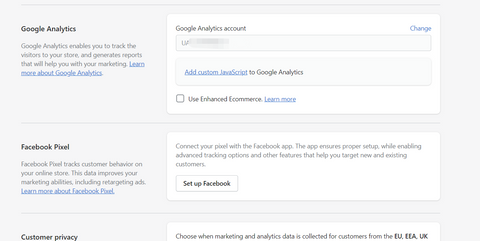
The problem with existing pixel tracking
There are several issues with existing pixel tracking.
1. The pixel is time-consuming to install and manage
In order to monitor customer behaviors, e-commerce stores are required to install tracking code manually. This code needs to be customized for specific events based on the store's front-end code. Unfortunately, this manual process is not only time-consuming but also prone to errors.
Additionally, the tracking code should be changed according to ecommerce store updates to avoid misresporting. It's also hard to manage, even with some tracking tag managers such as Google tag manager for Google analytics.
Due to the complexity of event tracking codes.The pixel is unable to capture every customer event, resulting in incomplete data.The pixel fails to connect with other marketing platforms such as Google or Facebook Ads due to incompatibility issues.
2. Third-party pixels can easily be blocked by ad blockers.
Up to 40% of users are using different kinds of ad blockers, leading to incomplete data collection and inaccurate insights. Browser restriction policies are typically implemented by the user's browser settings or plugin extensions, which limit the types of code that can be executed on a page.
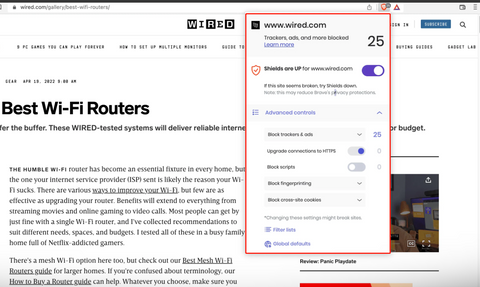
This means that pixel tracking code may not always execute correctly and could potentially result in large amounts of lost data. To ensure accurate pixel tracking, it is important for merchants to understand how their customers interact with their website and take steps to minimize any potential interference from browser restrictions policies.
3. Third-party cookies will be phased out shortly
In a major development for online privacy, Google has recently announced that starting from 2024, they will be conducting tests on 1% of Chrome users, ultimately leading to the phase-out of all third-party cookies that connect to external sources. This move aims to enhance user privacy and security by limiting the tracking capabilities of websites and advertisers.
With the elimination of third-party cookies, businesses relying on these tracking methods will need to find alternative ways to gather customer data and track their online behavior. This change will have a significant impact on digital marketing strategies, as marketers will need to explore new methods and technologies to understand their audience and deliver personalized experiences.
For Shopify merchants, this shift away from third-party cookies underscores the importance of leveraging first-party data.
Shopify's web pixel is a secure and reliable solution that allows merchants to track a variety of customer events, including those related to the checkout process. This ensures that businesses can still gather crucial data to optimize their marketing efforts and improve the overall customer experience.
4. IOS impact
The introduction of iOS 14 updates has had a significant impact on the tracking capabilities of ad networks, particularly when it comes to tracking consumer behavior on iOS devices. These updates have introduced stricter privacy measures, making it more challenging for businesses to accurately track and gather data from iOS users.
As a result, the tracking of customer interactions and events on iOS devices has become less reliable and more prone to inaccuracies. Ad networks are now facing limitations in their ability to collect data, leading to incomplete insights and a hindered understanding of consumer behavior on iOS.
This change has forced businesses, including e-commerce stores on Shopify, to find alternative ways to gather accurate data and gain insights into their iOS consumer base.
Why is Shopify restricting scripts on the checkout?
Shopify is restricting scripts on its checkout steps page to ensure customer security and privacy. By blocking potentially malicious scripts, Shopify is helping to protect customers from unauthorized access to their payment information as well as other sensitive data.
Furthermore, scripts have the potential to disrupt the checkout process, causing errors or delays that can negatively impact the overall customer experience. Hence, Shopify merchants must find a solution that allows them to collect crucial customer checkout data while ensuring the safety and reliability of their scripts.
What Is Shopify's web pixel & customer event feature?
Shopify's pixel & customer events API feature is a powerful tool that enables merchants to accurately track customer interactions on their website or app. By leveraging this technology, businesses can get insights into how customers are engaging with their website and gain an understanding of the full digital journey of each individual customer. This data can then be used to customize marketing campaigns and tailor offers to meet the needs of their target audience.
Shopify web pixels feature supports some most common events during the customer journey, as standard events listed below:
- Page view
- Product view
- add to cart
- collection view
- search terms
- checkout start
- checkout address info submitted
- checkout contact info submitted
- payment info submission
- checkout complete
- cart viewed
- Remove from cart
Merchants might also choose different filters( SKU and many other variants) to track specific customer conversion events. Such as add to cart for specific products.
Besides, merchants can also define custom pixels.
Shopify offers a secure sandbox environment for app pixels and custom pixels, so you can run scripts without worrying about disrupting the rest of your online Shopify theme store.
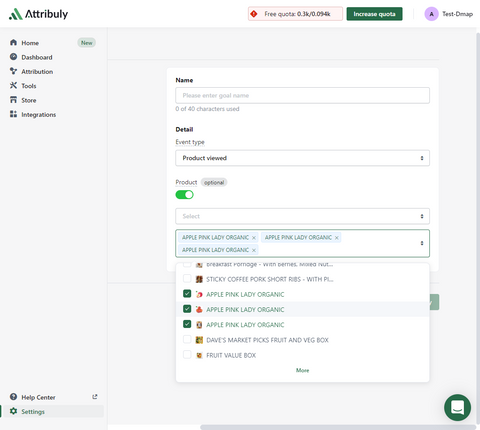
Benefits of Implementing Shopify Web Pixels
Before Shopify web pixel (or Shopify customer events), merchants need to manually add JavaScript in different places to track customer behaviors. in checkout pages, and theme files. These scripts not only were complex to install but also unable to capture every customer event. With the latest Shopify Web Pixel, tracking customer events can be super easy and accurate.

As mentioned by Shopify, the pixel provides below benefits:
- Access to a stream of customer events on your online store, including checkout events
- An additional layer of security for your online business and your customers, including greater control over the customer data that you share with third-party services
- Prevention of third-party code running non-performing Javascript, or interfering with your online store and checkout
- Built-in tools for privacy compliance
Shopify Web Pixels: First-Party Cookies & GDPR Compliance
Shopify Web Pixels are designed as a first-party tracking solution, meaning the data is collected directly by your Shopify store rather than third-party services. This helps preserve data accuracy and minimizes the risk of tracking being blocked by browser restrictions or privacy tools.
In addition, Shopify’s customer events and web pixel framework align with GDPR and other data protection regulations. Since the tracking runs through Shopify's infrastructure and offers clear consent options, it gives merchants in Europe and other regulated regions a more compliant way to monitor user behavior. For brands operating internationally, this combination of privacy and performance makes Shopify Web Pixels a reliable long-term solution for analytics and advertising.
Can Shopify Web Pixel track lead forms?
No, due to privacy considerations, web pixel can't track lead forms, such as pop-ups, and news letter forms. Attribuly contact create attribution feature helps track this event. It's an extension of the current web pixel feature.
Can Shopify web pixel track the checkout process?
Yes. The web pixel tracks the whole checkout process, even if you are not a Shopify Plus merchant.
- checkout start
- payment info submission
- checkout complete
For Shopify Plus merchants, more events in checkout are available:
- Checkout address info submitted
- Checkout contact info submitted
- Checkout ship info submitted
How to implement custom pixels?
If you need to track more events other than the stand one, you may consider custom pixel. To get started, merchants will need to have an understanding of basic HTML code. From there they can begin writing custom pixel scripts which they can then deploy onto their Shopify store in order to start tracking customer events.
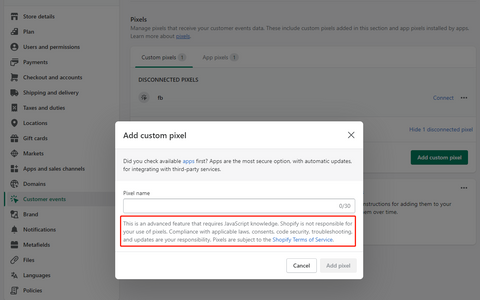
Given the potential risks associated with non-technical individuals editing code, Shopify strongly advises merchants to utilize the pixel app available in the app store.
How to implement Facebook pixel with Shopify customer events?
Pixel such as Facebook pixel, google tags can also be installed via the Shopify customer events feature. To set up the pixel, you need generate the tracking snippets with your own ID.
Can I use web-pixel data in server-side tracking for my Meta, Google ads?
Indeed, implementing server-side tracking along with accurate web-pixel data can be a game-changer. By combining this data with other sources from your Shopify orders, you can assist Meta and other ad networks in capturing the lost conversion signal in an unpredictable browser environment. This powerful strategy will significantly enhance your bidding optimization efforts.
Deploy Shopify customer event feature with Attribuly
As one the easiest apps that support Shopify Web Pixel, Attribuly is super easy to integrate with Shopify customer events API. Attribuly is also featured by Shopify app store.
When installing Attribuly, you get standard customer events data without any Javascript job. And you will find Attribuly registered at the app pixel list.
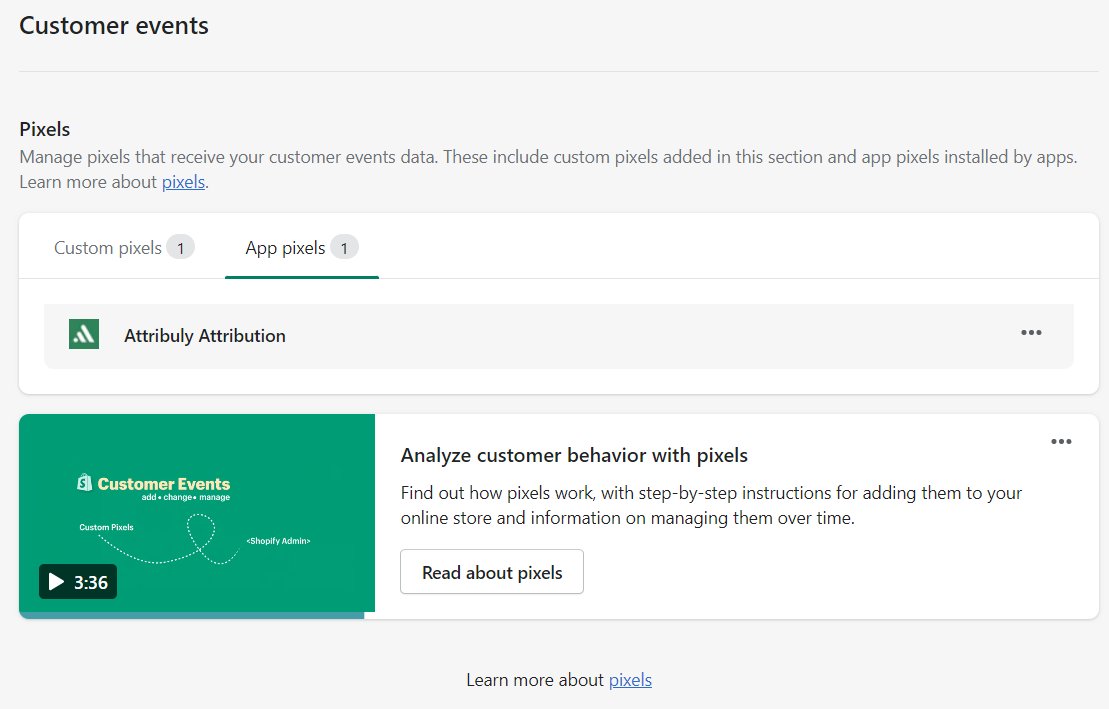
You may monitor real-time customer events with rich information. Such as product and total price information for product view, add to cart, checkout start, payment info submit, and checkout complete events.
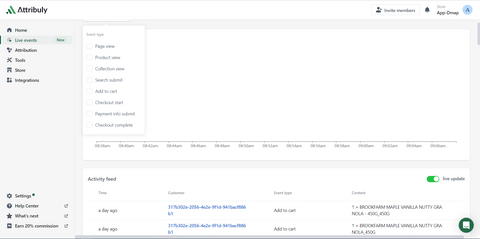
You can also click customer information to get single user customer journey with Attribuly leading Shopify customer identity resolution technology.
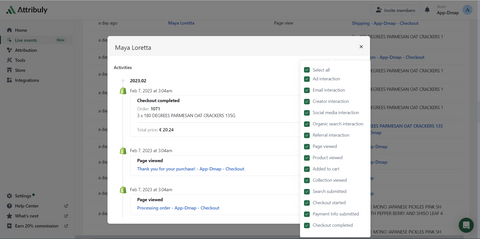
The customer events data is also the perfect data source for your marketing attribution, so you improve ROAS with accurate attribution insight.
